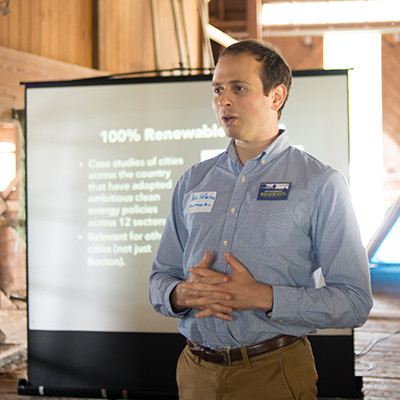
Ben Hellerstein
Former State Director, Environment Massachusetts
The new climate law is the product of years of work by legislators, environmental groups, industry leaders, and grassroots activists. Here's how we helped make it happen.
Updated
Former State Director, Environment Massachusetts
Last week, Gov. Charlie Baker signed a far-reaching climate bill that will help make our homes and businesses more energy-efficient, put more electric vehicles on the road, and ramp up the amount of electricity we get from the sun and wind.
When you think about global warming, you might feel concerned — and for good reason. We’re seeing the impacts of a warming climate all around us, as anyone who’s lived through the last few hot, muggy weeks can attest to.
But today I’m feeling hopeful. This bill is going to move us forward in a big way, especially when combined with recent climate legislation on the federal level. It’s easier than ever to see how Massachusetts can transition to 100% clean energy in the coming decades.
This new law is the product of years of work by legislators, environmental groups, industry leaders, and grassroots activists. We owe a lot of thanks to all of our partners in this effort.
It started with a vision. In 2016, we launched a campaign calling for a statewide transition to 100% renewable energy. It was a bold and ambitious goal — some might have thought at the time that it was a little overambitious — but we thought we could inspire people with a vision of a cleaner, healthier future, free from all of the negative impacts of fossil fuels. And we had the research to back up our claim that an energy system powered entirely by renewable resources was possible.
Next came the policy. We worked with legislators to introduce bills like:
We built a coalition. We partnered with groups representing some of Massachusetts’ biggest real estate owners and tenants — like Ceres and Health Care Without Harm — to advocate for energy efficiency standards for existing large buildings. We signed on more than 50 environmental and civic organizations to support a statewide commitment to 100% clean energy, and worked with the coalition Mass Power Forward to mobilize grassroots support.
We engaged civic leaders. We worked with dozens of local elected officials, health professionals, and business leaders to speak out in support of clean energy and energy efficiency policies. And we organized a summit for Massachusetts’ emerging leaders in the millennial generation to strategize for the transition to 100% renewable energy.
We mobilized the grassroots. We identified supporters through door-to-door canvassing, holding one-on-one conversations and distributing campaign literature to thousands of households. We helped MASSPIRG Students, a statewide organization of college students, organize dozens of lobby meetings at the State House and build grassroots support on their campuses.
It helps when some of the Commonwealth’s biggest institutions get on board. This April, UMass Amherst, Massachusetts’ flagship public university, committed to transition to 100% renewable energy for electricity and heating by 2032, thanks to persistent advocacy by the campus chapter of MASSPIRG. UMass joined other institutions, such as Harvard and Boston University, that have made commitments to 100% renewable electricity.
We lobbied elected officials. We pounded the pavement on Beacon Hill. And when the COVID-19 pandemic began, we kept lobbying over Zoom, connecting health professionals, students, and other allies with House and Senate leaders and rank-and-file members.
And when we hit the home stretch, we sprinted. As the clock ticked down toward the end of the legislative session on July 31, our canvassers spoke face-to-face with more than 10,000 people about the need for Massachusetts to act on climate, and collected 4,000 signatures calling on our elected officials to pass strong clean energy legislation.
And then, once the climate bill started moving through the House and Senate and to the governor’s desk, we:
Now that this bill (H.5060) has become law, here’s what it will mean for Massachusetts:
We’re taking big steps toward a cleaner, healthier, safer future for everyone. And when the new legislative session starts in January, we’ll keep pushing to accelerate Massachusetts’ transition to 100% clean, renewable sources of energy.
Former State Director, Environment Massachusetts
